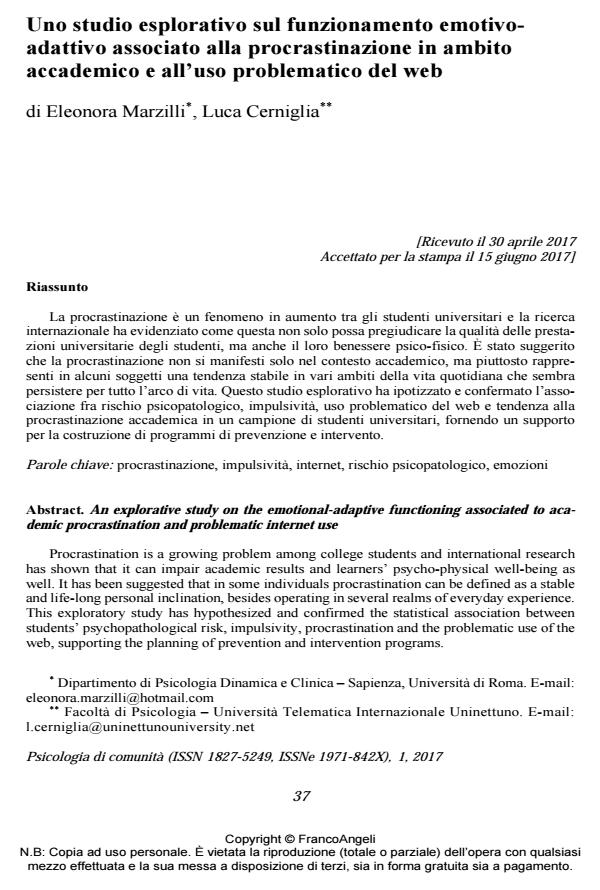Uno studio esplorativo sul funzionamento emotivo-adattivo associato alla procrastinazione in ambito accademico e all’uso problematico del web
Titolo Rivista PSICOLOGIA DI COMUNITA’
Autori/Curatori Eleonora Marzilli, Luca Cerniglia
Anno di pubblicazione 2017 Fascicolo 2017/1
Lingua Italiano Numero pagine 11 P. 37-47 Dimensione file 174 KB
DOI 10.3280/PSC2017-001004
Il DOI è il codice a barre della proprietà intellettuale: per saperne di più
clicca qui
Qui sotto puoi vedere in anteprima la prima pagina di questo articolo.
Se questo articolo ti interessa, lo puoi acquistare (e scaricare in formato pdf) seguendo le facili indicazioni per acquistare il download credit. Acquista Download Credits per scaricare questo Articolo in formato PDF

FrancoAngeli è membro della Publishers International Linking Association, Inc (PILA), associazione indipendente e non profit per facilitare (attraverso i servizi tecnologici implementati da CrossRef.org) l’accesso degli studiosi ai contenuti digitali nelle pubblicazioni professionali e scientifiche.
La procrastinazione è un fenomeno in aumento tra gli studenti universitari e la ricerca internazionale ha evidenziato come questa non solo possa pregiudicare la qualità delle pre-stazioni universitarie degli studenti, ma anche il loro benessere psicofisico. È stato suggerito che la procrastinazione non si manifesti solo nel contesto accademico, ma piuttosto rappresenti in alcuni soggetti una tendenza stabile in vari ambiti della vita quotidiana che sembra persistere per tutto l’arco di vita. Questo studio esplorativo ha ipotizzato e confermato l’associazione fra rischio psicopatologico, impulsività, uso problematico del web e tendenza alla procrastinazione accademica in un campione di studenti universitari, fornendo un supporto per la costruzione di programmi di prevenzione e intervento.
Parole chiave:Procrastinazione, impulsività, internet, rischio psicopatologico, emozioni
Eleonora Marzilli, Luca Cerniglia, Uno studio esplorativo sul funzionamento emotivo-adattivo associato alla procrastinazione in ambito accademico e all’uso problematico del web in "PSICOLOGIA DI COMUNITA’" 1/2017, pp 37-47, DOI: 10.3280/PSC2017-001004